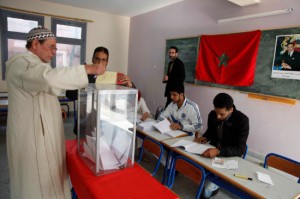 There’s a LOT going on in the Middle East/North Africa this week—elections in Morocco and Egypt, unrest in Syria, crackdown on protesters in Bahrain…the list goes on. Don’t have time to sift through all the commentaries and coverage? No problem. Let me break it down for you and give some highlights about what’s being said by the media about Morocco’s parliamentary elections last Friday.
There’s a LOT going on in the Middle East/North Africa this week—elections in Morocco and Egypt, unrest in Syria, crackdown on protesters in Bahrain…the list goes on. Don’t have time to sift through all the commentaries and coverage? No problem. Let me break it down for you and give some highlights about what’s being said by the media about Morocco’s parliamentary elections last Friday.
Today, the Washington Post’s “Right Turn” blogger Jen Rubin (@JRubinBlogger) put the Moroccan election in the greater regional context of how it can be compared/contrasted to other reform efforts, particularly Egypt. (Thankfully, she clarified up front that Morocco isn’t Egypt and vice-versa, but that they “face common challenges.”) What I found most interesting was when Jen wrote,
“The United States has a limited but critical role to play in these sorts of situations. While it is likely not effective for Washington to insert itself by demanding a specific timetable, the U.S. government can certainly apply diplomatic pressure and hold out the lure of improved relations, trade and investment if Egypt moves toward a more democratic system.”
I agree that the role the US could play is limited and it would appear that US policymakers are taking a “hands-off” approach to developments in the region, careful not appear that they are trying to influence outcomes. (I actually think that US policymakers are all over the place when it comes to US policy in the region and this lack of a cohesive, clear policy just gives the appearance that they actually know what’s going on and have decided to take the “hands-off” approach.) The US SHOULD use its influence—diplomatic, economic, etc.—to encourage democracy in the region. I would just add that the US officials should do a better job at publicly and strongly praising examples in the region, like Morocco, who are making genuine reforms and “getting it right.”
Daphne McCurdy, a senior research associate at the Project on Middle East Democracy (POMED), who was one of the 4,000 US, Moroccan and international elections observers in Morocco last week, shared her perspective on Foreign Policy’s Middle East Channel. I was really anxious to hear what an American elections observer had to say, but I was disappointed in some of her characterizations, which were a bit pessimistic and a tad unfair. Daphne writes,
“Like the rest of the Middle East and North Africa, Morocco was faced with popular protests earlier this year. However, in contrast to other rulers who responded to demonstrations with force and refused to make concessions until too late, King Mohammad VI quickly promised constitutional reforms, getting ahead of protesters and effectively undermining their influence. Democracy activists saw this as little more than the king’s tried and true strategy of implementing superficial changes to appease the public without changing the country’s fundamental power structure.”
I believe in holding political leaders accountable for sure, but cut the King some slack. If he had moved too slowly, then haters would have said he didn’t genuinely want reform. (I was in Rabat, Morocco in late January of this year and watched Ben Ali’s speech when he told Tunisians that he would make his exit by…2014. Tunisians were like, “Umm, how about you leave now?”) So, the fact that he moved “quickly” means he was just trying to “undermine” the protesters with “superficial changes”?
And I totally disagree that the changes are superficial. Yes, the King still maintains significant powers and control, but for the first time, he must choose a Prime Minister from the party which wins the most seats in the election AND key appointments (ministers, ambassadors, etc.) are to be done in consultation with the Parliament—which has NEVER been done before in Morocco. I guess I just see the mint tea glass half full.
I do wholeheartedly agree with Daphne’s conclusion that “political parties [should] take more ownership of the political process.” I believe that is what the King is attempting to do with the recent reforms…to empower Morocco’s historically weak political parties to be real actors and representatives held accountable by the Moroccan electorate.
Also today, on Forbes.com, author Richard Miniter did a good job dispelling many misconceptions/false assumptions about the PJD (Islamists) who won the most seats in Friday’s election. Miniter correctly notes that the PJD didn’t win the most votes because of some radical, religious agenda. Rather, they focused on education, jobs and economic reform. THIS is what the Moroccan people want and need and their support of the PJD demonstrates this. Miniter writes,
“The PJD won them [voters] over by focusing on fighting corruption and creating jobs. If they fail at either one, they will lose the next election.”
If that’s not good ol’ democracy at work, then I don’t know what is.
Miniter also makes the point I made earlier,
“President Obama should take a moment to congratulate Morocco on a successful election and urge the Islamists to stick to their platform of economic hope and change.”
Exactly.
By the way, The Christian Science Monitor published a really bizarre, confusing and lop-sided opinion piece by Ellen Lust on the Moroccan elections. Don’t even get me started.
The one article that I have yet to see—but would love to—is a look at how Morocco held free and fair democratic elections in the Western Sahara. (In the refugee camps controlled by the Polisario Front, there’s only one allowed political party—the Polisario Front—which makes vote tallying REALLY easy.) Any takers?
Stay tuned later in the week for “W.W.(P).J.D?: Facts, Fears & Fortune-telling about Islamists in Morocco, Egypt & Tunisia.”